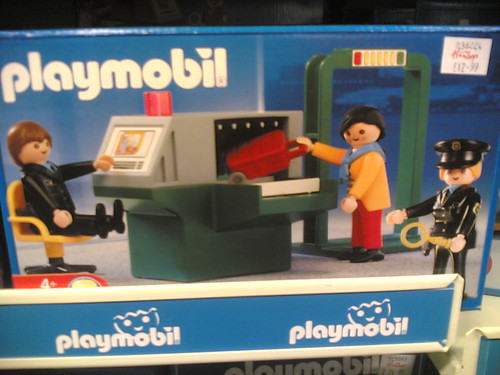Security/Insecurity in the News: First Dispatch
 New feature time. Again.Every other Friday we'll offer a compilation of links and news stories that connect to notions of security and insecurity, our 2013-2014 departmental theme. Some of these connections will be clearer than others - we're interpreting the theme very, very broadly. So, have at it, and enjoy!Comedian Louis C.K. takes on the smart phone and why it makes us feel sad (Big Think)Louis Menand reviews Eric Schlosser's Command and Control, a new book on nuclear weapons in America (The New Yorker)"The importance of the afterlife. Seriously." Seriously. (The New York Times)What will 3-D printing actually bring us in the future? "Will it save the world? Will it bring on the apocalypse, with millions manufacturing their own AK-47s? Or is it all an absurd hubbub about a machine that spits out chintzy plastic trinkets?" (The New York Times)The myth of executive stress: how hard is it, really, to be the boss? (Scientific American)Guardian editor: NSA surveillance goes beyond Orwell's imagination (The Guardian)A moment-by-moment timeline of the immediate aftermath of Kennedy's assassination. "From noon to dusk on November 22, 1963, history went dark, locked inside the closed and crowded cabin of Air Force One. Fifty years later, what happened after JFK died has fully come to light." (Esquire)Are soldiers becoming too emotionally attached to the robots that accompany them in war zones? (Slate)For more about American Studies at UT, subscribe to our newsletter here.
New feature time. Again.Every other Friday we'll offer a compilation of links and news stories that connect to notions of security and insecurity, our 2013-2014 departmental theme. Some of these connections will be clearer than others - we're interpreting the theme very, very broadly. So, have at it, and enjoy!Comedian Louis C.K. takes on the smart phone and why it makes us feel sad (Big Think)Louis Menand reviews Eric Schlosser's Command and Control, a new book on nuclear weapons in America (The New Yorker)"The importance of the afterlife. Seriously." Seriously. (The New York Times)What will 3-D printing actually bring us in the future? "Will it save the world? Will it bring on the apocalypse, with millions manufacturing their own AK-47s? Or is it all an absurd hubbub about a machine that spits out chintzy plastic trinkets?" (The New York Times)The myth of executive stress: how hard is it, really, to be the boss? (Scientific American)Guardian editor: NSA surveillance goes beyond Orwell's imagination (The Guardian)A moment-by-moment timeline of the immediate aftermath of Kennedy's assassination. "From noon to dusk on November 22, 1963, history went dark, locked inside the closed and crowded cabin of Air Force One. Fifty years later, what happened after JFK died has fully come to light." (Esquire)Are soldiers becoming too emotionally attached to the robots that accompany them in war zones? (Slate)For more about American Studies at UT, subscribe to our newsletter here.
Grad Research: Carrie Andersen Writes on Louis C.K.'s Conservative Vision
Graduate student Carrie Andersen has just published a piece for the Radio-Television-Film department's online journal, Flow. She explores the surprisingly conservative threads within stand-up comedian Louis C.K.'s oeuvre, whose television show on FX (aptly entitled Louie) deals with moral questions more often than we might expect from typical comedy programs.

An excerpt is reprinted below and the full article is available here:
...Louie explores lofty questions that half-hour comedy programs rarely confront. How do we live a good life? How do we cultivate a code of conduct for our world? How can we avoid being awful to each other?
C.K. is no stranger to questions of living an ethical life—and, aware of his moral choices, often puts his own behavior on trial. In his December 2011 stand-up special, Live at Beacon Theater, the comedian describes one of his own falls from grace.
[soundcloud url="http://api.soundcloud.com/tracks/56604415" iframe="true" /]
Too late for a flight to return his rental car, C.K. simply drives the car to the terminal—not to the rental car return—and boards his flight. He then calls Hertz to explain where the car is, and the employee exasperatedly explains the proper rental return procedure. C.K. replies matter-of-factly, “Well, I didn’t do that already, and now I’m leaving California.” Hertz sends an employee to retrieve the car, and C.K. avoids any consequences from his failure to abide by the rules.Although C.K. realizes he could do this every time he flies to avoid Hertz’s bureaucratic song and dance, he knows it is wrong. Considering the broader consequences of this behavior, Louis advises, “You should act in a way, that if everyone acted that way, things would work out. Because it would be mayhem if everyone was like that.” This is Louis C.K.’s crude twist on Immanuel Kant’s categorical imperative: for Kant, a principle (or, in his words, a maxim) is ethical if it would “become through your will a universal law of nature.”C.K.’s maxim is, of course, not a strict reinterpretation of Kant’s. Louis is concerned with the outcome of his actions—he wants “things to work out”—while Kant questions whether we act in alignment with what duty requires of us. But both evaluate ethical choices based on the negative criterion of universalizability: you can’t make exceptions for yourself even if you want to.
(image from The AV Club)